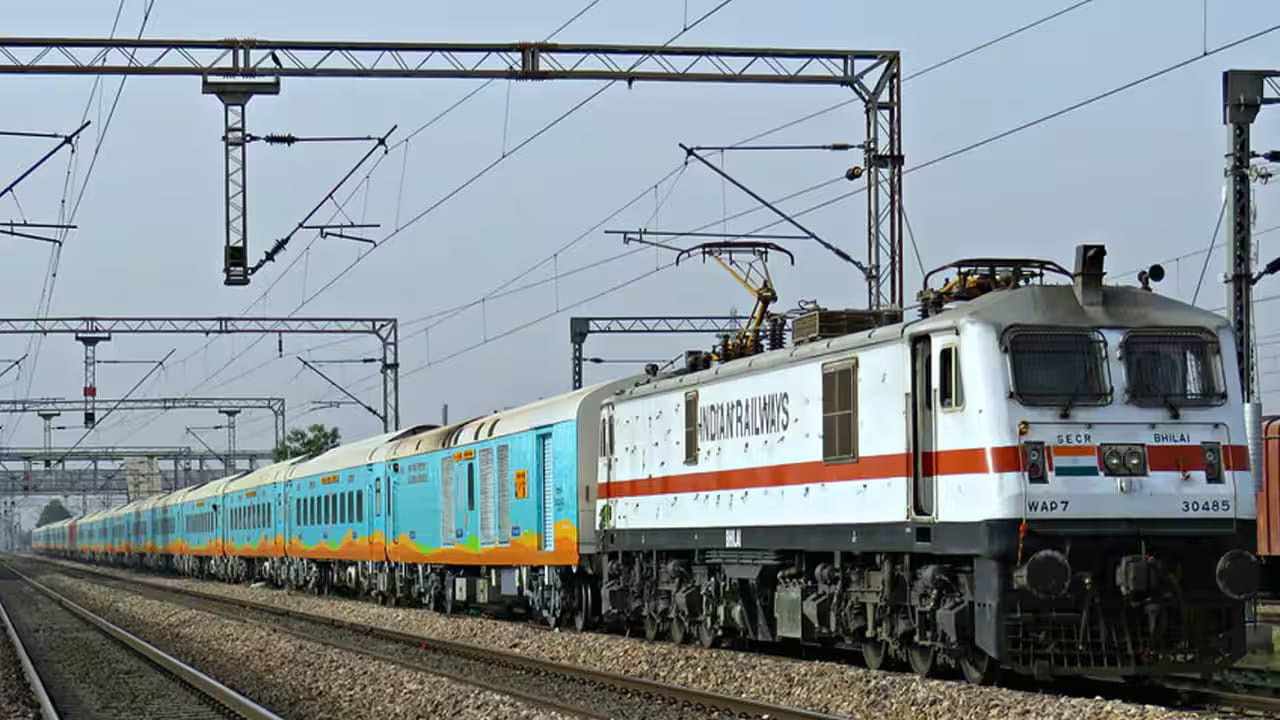Railway jobs that make a career in the railway industry can be a rewarding and challenging journey. With a wide range available from engineering to customer service, the railway field offers different opportunities for individuals with different skills and interests.

The railway industry is not just about transport; It is about connecting society and driven economic development. As the demand for efficient and reliable transport increases, the railroad career requires skilled professionals. Whether you just start your career or look for change, the railway industry has a lot.
Key Takeays
- Various roles available in the railway industry
- Opportunity for different skills and interests
- Increasing demand for skilled professionals
- Contribution in economic development and social conditions
- Career Development and Progress Opportunities
The railway industry in the United States
Edward L. Hamilton, CEO of the Association of American Railroads, said: “As the foundation stone of US transport, Railways has been an important contribution to shaping the country’s economic landscape.” The railway industry in the United States is a complex network that plays an important role in the country’s economy and transport infrastructure. With evolving workforce needs, the industry is also opening doors for Part time jobs, providing flexible opportunities while supporting critical transport operations.
Current status of US railways
The current status of the American railways is characterized by a large network that is at a distance of thousands of miles, which facilitates the movement of goods and people across the country. With a strong focus on safety and efficiency, the industry continues to develop, which includes new techniques to increase operations.
Economic impact and industry size
The railway industry contributes significantly to the US economy, generates sufficient revenues and provides railway industry jobs for thousands of Americans. According to the Association of American Railroads, the railway industry is an industry of $ 73 billion that supports around 1 million jobs.
Rail role in modern transport
Railways play an important role in modern transport, which introduces goods and people in an efficient and environmentally friendly way of moving. As the demand for sustainable transport solutions increases, the importance of railway operating jobs is likely to increase, and further emphasizes the importance of industry.
“Railroads are a critical part of the U.S. transportation system, and they play a vital role in the nation’s economy,”
Association of American Railroads
Why consider a career in rail?
With its rich history and modern progress, the railway industry presents several career paths worth considering. The industry is not just about trains and tracks; It is about being part of an important infrastructure as further economy.
Stability and job security
One of the most important benefits of careers in railroads is job security. The railway industry is less likely to be affected by economic recessions compared to other sectors, offering a stable environment for professionals. In addition to full-time roles, there is a growing demand for part time jobs, such as train conductors and support staff, providing flexible yet reliable career opportunities in the industry.
Competitive profit and compensation
Railway careers often come with competitive salaries and extensive profit packages. Employees in the railway sector can not only expect a decent income, but also additional flights such as health insurance and pension schemes.
Work Life Balance Opportunities
A career in the railways can provide a good balance between work and life based on a specific role. Some positions are allowed regularly for working hours, while others may require shifts or overtime.
Planning option
The railway industry offers different planning alternatives. Some roles, such as maintenance, may have more traditional hours, while operating roles that leaders may have different changes.
Location Flexibility
Railway career space can provide flexibility. While some jobs are linked to specific places, others may be involved in traveling or transferring to different fields.
| Job Type | Typical Schedule | Location Flexibility |
|---|---|---|
| Conductor | Varied Shifts | High |
| Maintenance | Regular Hours | Medium |
| Administrative | Standard Office Hours | Low |
Exploring Railways Jobs: Types and Categories
The railway industry is a complex system that requires a multitude of roles to function efficiently, including operations, engineering, and management positions. With a wide range of job opportunities available, individuals can find a career path that suits their skills and interests.
Operating post
The operating items are important for the daily function of the railway industry. These roles ensure safe and timely movement of trains and cargo.
Conductor and engineer
Conductor and engineer are the most important employees of railway business. Conductor passengers and freight treatment for transport of goods, while engineers use trains, make sure they follow the plan and the safety protocols.
Relationships and Traffic Controls
Dispatchers and traffic controllers play an important role in the coordination of train movements. Dispatchers manage train schedules and routes, while traffic controllers monitor and direct trains to prevent accidents and delays. With evolving workforce needs, these critical roles are also being offered as part time jobs, allowing for flexible work options while maintaining safety and efficiency in rail operations.
Maintenance and engineering roles
Maintenance and engineering roles are necessary to maintain the integrity and safety of the railway infrastructure. These professionals ensure that tracks, signals and equipment are in good working conditions.
Track maintenance workers
Track maintenance workers are responsible for inspection, repair and maintenance of railway tracks. Their work is important to ensure the safety of train operations.
Indication and communication technicians
Signal and communication technicians install, maintain and repair signal and communication systems. These systems are important for safe train operations, which enables efficient movement of trains.
Administrative and Management Opportunities
In addition to operations and maintenance, the railway industry offers various administrative and management opportunities. These roles support the general steering and the direction of railway companies.
Some major administrative and governance roles include:
- Operator
- Maintenance supervisor
- Logistics coordinator
- Human resources
The railway industry provides a variety of career opportunities, from railway business jobs to railway technical jobs and railway maintenance jobs. Whether you are interested in needlework or administrative roles, it is a place for you in the railway sector.
Necessary skills and qualifications for railway career
In order to succeed in railroad careers, one must have a unique mix of technical and soft skills. The railway industry requires a variety of skills and qualifications to ensure safe and efficient operation.
Technical requirements
Technical skills are important for many railway jobs. For example, engineers and maintenance personnel require special training in areas such as locomotive mechanics, electrical systems and signal maintenance. To understand the complex machinery and the technical manual required for these roles. In addition, knowledge of safety protocols and rules is important to prevent accidents and ensure compliance with industry standards.
Soft skills that matter
While technical skills are important, soft skills play an important role in the success of railway personnel. Effective communication, teamwork and problem solving opportunities are very valuable in the industry. Railway workers often work in teams and can coordinate with others to achieve general goals. In addition, good communication skills are necessary to interact with colleagues, managers and customers.
Educational relationship
Education requirements for railway careers vary depending on the job. Some entry-level positions may require a high school diploma or equivalent, while several technical roles need specialized training or an associate degree. Certain positions, such as engineers, require a bachelor’s degree in relevant fields like mechanical or electrical engineering. Alongside full-time roles, many railway departments also offer part time jobs, providing flexible opportunities for individuals with varied educational backgrounds.
Physical demand and requirements
Many rail jobs come with physical requirements, including working in different weather conditions, raising heavy objects and being on their feet for extended periods. Physical endurance and ability to work in challenging environment required for some roles. In addition, some positions may have to pass physical examination or maintain certain health standards.
Understand the necessary skills and abilities required for railway careers, individuals can better prepare for industry requirements and increase the chances of success in the opening of railway jobs.
Chief Railway employer in the US
Large railway workers in the United States include a series of goods, passengers and regional operators, offering various railway industry jobs and railway management jobs. The railway industry is an important employer, where different companies across the country work.
Class in Cargo Railroad
Class I railway is one of the largest employers in the railway industry. They run giant networks and provide more job opportunities.
Union Pacific & BNSF
Union Pacific and BNSF railways are the two largest freight rails, known for their extensive network and significant contributions to the railway industry.
CSX and Norfolk Southern
CSX Transport and Norfolk are other major players, offering more jobs in operation, maintenance and management.
Passenger Railway Service
Passenger rail services provide sufficient employment opportunities in the railway industry.
Amtrack
Amtrar Dia is the primary passenger rail service, which offers jobs in different fields, including customer service and engineering.
The committee’s railway systems
Commuter provides additional job opportunities in areas such as railway systems, local transit managers who are run by, operation and maintenance.
Regional and small line operators
Regional and small line operators play an important role in the railway industry, connect small areas to a wide network and offer special jobs.
Entrance level Railway jobs and how to qualify
For those interested in railway jobs, several entrance level posts can serve as a step stone. The railway industry is enormous and gives a number of roles that meet different skill sets and interests.
Conductor and engineer are the most sought after among the entrance level jobs in trainee posts. As conductor or engineer trainee, you will undergo training to know the complexes of railway business. These roles are important for the steady function of trains and provide a basis for future career development.
Conductor and Engineer Trainee Post
In order to qualify for conductors and engineer -trainee positions, you usually require a high school diploma or equivalent. Some railways may require extra certificates or training. The role involves working under the supervision of experienced conductors or engineers to learn the necessary skills in the role.
As “The Railway Age” notes,
“The demand for qualified train crews continues to grow as the industry expands.”
This highlights the importance of training programs for conductors and engineers.
Maintenance and track worker roles
Maintenance and track worker roles are necessary to ensure safety and integrity in the railway. These posts include inspection, maintenance and repair of tracks, signals and other equipment.
A high school diploma is required, and some employers may prefer candidates with relevant technical training or certificate. The world training is usually provided to make workers familiar with specific equipment and procedures.

Customer service options
The railway industry includes interaction with passengers in customer service roles, deals with investigation and solves problems. These positions require strong communication skills and customer -focused approaches.
Although a specific degree is not always necessary, excellent mutual skills and the ability to work under pressure are important qualifications.
Internship and apprenticeship
Interns and trainees provide valuable hands experience and can be a great way to enter the railway industry. Many railways offer internships that allow students or graduates to gain practical experience.
Apprenticeships combine training in the world with formal instructions, capable of developing individuals to develop specific skills required for some railway businesses.
By searching for these opportunities at the entrance level, individuals can start a rewarding career in the railway industry. With the right training and profit, anyone can successfully navigate in different available roles.
Advanced railway jobs for experienced professionals
For experienced professionals, the railway industry offers several advanced job opportunities that benefit from their skills and experiences. These roles not only provide challenging tasks but also provide opportunities for career development
Senior engineering post
Senior engineering positions in the railway industry include supervising complex projects, managing teams and ensuring that the projects are completed in time and within the budget. These roles require strong technical knowledge and leadership skills.
- Railway design and development of basic infrastructure
- Project management and team management
- Collaboration with cross -functional team
Leadership and supervisory roles
Management and supervisory roles are important in the railway industry, which ensures steady operation of daily activities. These posts include strategic plan, employee management and compliance with safety rules.
Large responsibilities include:
- Operational governance and supervision
- Personnel training and development
- Security and compliance monitoring
Special technical career
The railway industry provides various special technical careers that require specific skills and knowledge. These roles are important for maintaining and improving railway operations.
Examples include:
- Signaling technician
- Locomotive engineer
- Railway Inspector
Executive leadership options
Exercise opportunities in the railway industry include determining strategic directions, making large decisions and supervising the company’s overall direction.
Exercise roles include:
- Chief Operating Officer (COO)
- Chief engineer
- Operator
Application process for railway jobs
The process of searching rail jobs includes several stages, which range from finding the opening of the ESING interviews. In order to increase the possibility of success, it is necessary to understand each step of the application process.
Job enclosure
To start, you need to find the opening of the available railway job. It can be done through this:
- The company’s website and job board: Many railway companies show the opening of their jobs on their official websites. You can also check popular job boards.
- Industry -specific resources: Use industry -specific job boards and professional networks to find railway jobs.
Prepare your application
Once you have opened a suitable job, it is important to prepare a strong application. Make sure your CV is up to date and matches job requirements. A well -written cover letter can also create a significant difference.
Interview Tips and Assessment Expectations
After submitting your application, you may be invited to an interview. By researching the company, preparing you to practice general interview issues and understand the assessment expectations.
“Preparation is key to acing a railway job interview. Research the company and practice your responses to common interview questions.”
Requirements for background check and drug testing
Many railway jobs require background checks and drug testing as part of the hiring process. Be prepared for these extra steps.
| Job Category | Background Check | Drug Testing |
|---|---|---|
| Operations | Yes | Yes |
| Maintenance | Yes | Yes |
| Administrative | Yes | No |
Training programs and certificates in the railway industry
Training and certification are important components of a successful railway career. The railway industry is strongly regulated and requires special knowledge and skills to ensure safety and efficiency.

Required certificate
Railway personnel should be given different certificates based on their role. For example, locomotive engineers require certification from the Federal Railroad Administration (from). Certificates often require passing written exams and perform practical skills.
Company-Sponsored Training
Many railway companies offer new prices and comprehensive training programs for existing employees. These programs may include class instructions, training and simulation -based training in the world. The company helps the training staff up to date with the latest technologies and industry practices.
Sustainable educational opportunities
Constant education is important in the railway industry due to developed technologies and rules. Professionals can pursue advanced certificates, participate in workshops and attend conferences to improve their skills. Constant educational opportunities help railway personnel to be competitive and move on in their careers.
Security training and compliance
Safety training is an important aspect of railway business. Employees receive regular training in safety procedures, preparedness and compliance with government requirements. As a industry specialist noted,
“Safety is not just a priority; it’s a culture that permeates every aspect of our operations.”
By investing in training and certification, railway personnel can ensure a safe and successful career in this dynamic industry.
Wage expectations and benefits in railway jobs
Understanding wage expectations and benefits associated with rail jobs is important for individuals who want to create a successful career in this field.
Pay from the situation
Railway jobs include a wide range of posts, each with its own pay scale. Compensation can vary greatly depending on factors such as job roles, experience and location.
Entrance compensation
Input level posts in the railway industry, such as conductor or engineering trainees, usually begin with competition wages. These roles often have several benefits, including health insurance and pension plans.
Caller and senior revenue
As professional experiences gain and enter the middle of the career or senior roles, earning ability increases. Senior positions, such as management or special technical roles, can command high salaries and additional quotas.
Benefit pack
In addition to salaries, railway jobs often have extensive profit packages. These may include health, dental and visual insurance, as well as payment time and holidays.
Main Benefits:
- Extensive health insurance
- Pension plan with employer Milan
- Paid leave and sick leave
- Insurance
- disability insurance
Union membership result
Many railway employees are members of trade unions, who can provide additional benefits and security. Union membership can provide benefits when it comes to job security, collective negotiating power and access to training programs.
Pension and pension scheme
The railway industry is known for strong retirement and offers of pension schemes. These schemes can provide financial security for employees in the pension years, and often complement other sources of income.
The combination of competitive salaries, extensive profits and safe pension schemes provides an attractive alternative for many individuals in the railways.
Future of Railway Jobs in America
The railway industry in the United States is in a tail of a significant change. When we look at the future, many factors are expected to form the landscape of railway jobs.
Industry growth estimates
The railway industry is estimated to experience stable growth, inspired by the growing demand for transport and the need for skilled logistics solutions. According to recent studies, the industry is expected to increase by 5% over the next decade, which provides new opportunities for professionals in the region.
Technological Advancements
Technological progress brings revolution in the railway industry. There are two major focus areas:
Automation and integration
Automation and AI are integrated into various aspects of railway operations, efficiency and safety are increased. For example, the use of AI can help prevent future maintenance tool errors.
Green technology
The industry also embraces green technologies to reduce environmental footprint. This involves using electric locomotive and more efficient braking system.
| Technological Advancement | Impact on Railways |
|---|---|
| Automation | Increased efficiency and safety |
| AI Integration | Predictive maintenance and optimized operations |
| Green Technologies | Reduced environmental impact |
Stability initiative
Railway companies implement different stability initiatives, such as reducing emissions and increasing energy efficiency. This effort not only benefits the environment, but also contributes to the industry’s long -term viability.
Infrastructure investment impact
The investment in the railway infrastructure is important for the development of the industry. Upgrading to track, signal and stations will not only improve safety, but will also enable rapid and more efficient transport, which is likely to increase railway jobs.
Conclusion: To take the first step toward your railroad career
Creating a career in the railway industry can be a rewarding and challenging experience. From operation and maintenance to administrative roles, with a wide range of job opportunities, it is a way to fit different skills and interests. As discussed, the railway careers offer stability, competitive advantage and development opportunities.
The railway industry is evolving, changes with technological progress and initiative for stability. Considering a career in the railways, you not only get a job, but become part of an important field that contributes to the economy and the environment. To take the first step, find out the opening of the job, and assess training programs or certificates that can increase your profit.
Whether you start now or want to pursue your career, the railway industry jobs give a promising future. With the right skill and determination you can succeed in this dynamic field. Start your journey today by researching the railway career and taking an initial step towards a full profession.
FAQ
What are the most sought -after rail jobs?
The most sought-after rail jobs include conductors, engineers, broadcasts, track maintenance workers and signal and communication technicians, who highlighted in the section on the discovery of railway jobs.
What are specific wage restrictions for railway jobs?
The salary status of railway jobs varies depending on the status, experience and employer, with an entrance level positions such as conductor trainies with $ 60,000- $ 60,000- $ 80,000 per year and senior engineer or management roles earn $ 120,000 or more, as discussed in the section.
Do I need a college education to work in the railway industry?
While some railway jobs require special training or certificates, others may need college degrees, especially for engineering, management or administrative roles, as mentioned in the section of necessary skills and qualifications.
How do I get the inauguration of a railway job?
Inauguration of railway jobs can be found on the company’s websites, industry -specific job boards and resources such as the Railway Association of Canada or the American Public Transportation Association, as mentioned in the section on the application process.
What kind of training is required for railway jobs?
Training requirements differ from jobs, but many railway employees undergo training, training, training or certification programs, for example for conductors, engineers or signal maintenance, as training programs and certificates have been discussed in the section.
Are rail jobs physically demanding?
Some rail jobs, such as track maintenance or management work, may physically require, for a long time, manual work and home require time from home, as mentioned in the section if necessary skills and abilities.
What benefits do rail employees usually receive?
Railway employees often receive broad benefits including health insurance, pension plans and paid time, offer extra quotas such as food deductions or travel discounts with some employers, who highlighted in the section on wage expectations and benefits.
Can I work in the railway industry if I have a disability?
Many railways can be adapted to accommodate disabled employees, and some employers offer programs or resources to support disabled employees, who discussed in the section on the discovery of railway jobs.
How do I pursue my career in the railway industry?
Career development in the railway industry involves frequent experience, develops new skills and pursues extra certificates or training, with opportunities to promote senior roles or special positions, as mentioned in the section on advanced railway jobs.
What is the future approach to the railway industry?
The railway industry is expected to be inspired by the growing demand for growing, goods and passenger rail services, as well as investing in infrastructure and technology, as discussed in the part of railway jobs.




